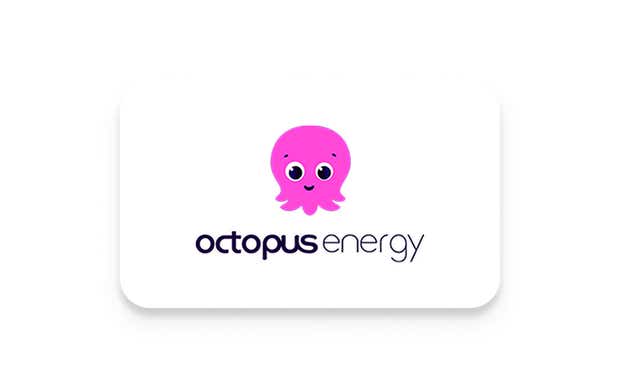Octopus Energy tariffs, prices, reviews and other information
One of the most popular and innovative energy suppliers in the UK, Octopus Energy entered the UK energy market in 2016, using technology to create a leaner business from the ground up and ensure future room to grow.

Why choose Octopus Energy?
Octopus Energy has grown significantly since its foundation, largely thanks to acquiring the customers of other suppliers that have gone bust, notably Bulb, which had 1.5 million customers when it went into administration, and Shell Energy, which sold its customer base to Octopus when Shell exited the UK retail energy market. Octopus is now the biggest energy supplier in the UK, supplying 24% of electricity customers and 24.1% of gas customers as of the end of 2024.
The supplier has also invested heavily in energy efficiency measures along with green energy and electric vehicle infrastructure, as well as expanding operations outside the UK to places as far away as Texas.
Octopus Energy also won top prize in Uswitch's 2025 Energy Awards with its customers voting it the best supplier for Overall Customer Satisfaction. It also won the top prize in the 2024 awards. In 2025, it came top in the Best Customer Service category and shared the top spot for Best Value For Money.
Varied range of tariffs
Extensive products and services offered outside energy supply
Award-winning customer service
Commitment to renewable energy supply and generation
How do I contact Octopus Energy?
Emails and calls to Octopus Energy are answered by UK-based energy specialists, with average call wait times under a minute.
Octopus has a wide range of guides and FAQ answers on its site, but in the event that you still need to talk to somebody, you can contact its team using the following methods:
- Phone: 0808 164 1088 (Monday-Thursday 9am-5pm, Friday 9am-4pm)
- Email: hello@octopus.energy
If you want support for heat pumps, solar panels or EV chargers, you can call 0808 164 1088.
You can also use a free SignVideo service with BSL interpreters Monday-Thursday 9am-5pm and Friday 9am-4pm.
What tariffs are offered by Octopus Energy?
Octopus Energy has a vast range of energy tariffs on offer - at the time of writing, there were 72 available to switch to (across domestic, business, credit and prepayment options). It offers fixed rate and variable tariffs where unit rates are fixed or variable according to the level of the energy price cap. Fixed tariffs are popular with those wanting price certainty over a year or more, while variable tariffs could be the cheapest option for many customers in the wake of the wholesale energy market crisis.
Other Octopus Energy tariffs include the Tracker tariff, which is based on the daily wholesale price of energy, and the Agile Octopus tariff, which has half-hourly rates.
The Octopus Go Tariff is a time-of-use tariff designed especially for households with an electric vehicle, offering cheaper night rates to help make charging more affordable.
Does Octopus charge exit fees?
Octopus charges exit fees on business tariffs but doesn’t tend to do so on domestic tariffs. Customers should check whether exit fees apply to their tariff before they sign up.
Octopus Energy reviews 2025
Octopus Energy has a TrustPilot score of 4.8 from over 612,000 reviews, as of June 2025. Most reviews are overwhelmingly positive, with 90% of the total reviews rating the supplier at the maximum of five stars.

Can I get a smart meter with Octopus?
You can get a smart meter with Octopus. They make thousands of appointments available across the country each week, though they may not be in your area immediately. Customers can register their interest and then be notified when appointments are available in their area.
Does Octopus Energy offer energy efficiency products?
As mentioned above, Octopus offers smart meters but also products like smart meters and heat pumps, along with specific electric vehicle charging tariffs. These can be combined with “smart tariffs” that offer lower energy rates at certain times to help customers use energy more efficiently and bring their bills down.
Octopus Energy 2024 customer rating
In the 2024 Uswitch Energy Awards, Octopus Energy scooped the Overall Customer Satisfaction prize and came second in the Best Customer Service and Best Value For Money categories. As these awards are voted for by customers, Octopus's successes here reflect the high regard its customers have for it as a supplier.
Frequently asked questions
Does Octopus offer renewable energy?
All Octopus energy tariffs offer 100% renewable electricity, with energy needs met by clean, green sources like solar and wind power. To reduce carbon footprints even further, Octopus can offset the carbon emissions from the gas customers use for a few pounds extra each month. In the last year alone, 26,900 tonnes of CO2 have been saved from entering the atmosphere thanks to customers choosing Octopus’ low-carbon energy over an average standard tariff. That's roughly the same climate impact as planting 365 trees for each and every Octopus Energy customer.
Does Octopus Energy have an app?
Octopus Energy has an app which acts as a way for customers to manage their energy on the go. Similarly to logging in to an account on a computer, customers are able to see their latest usage and statements, make payments and get help with any problems they're having.
Octopus Energy customers have access to an online account, with features from editing Direct Debit amounts and dates, to entering a meter reading, to managing email and account preferences, requesting a credit refund, and booking a smart meter installation.
Which providers are similar to Octopus Energy?
Octopus’s size and range of tariffs and products offered mean it isn’t really comparable to any other providers. Other members of the big six - British Gas, EDF, E.ON, OVO and ScottishPower - would be the closest alternatives to it.
How do I cancel my Octopus Energy supply?
If you want to cancel your Octopus Energy supply, you simply need to switch to a new supplier. However, remember that you could end up having to pay exit fees if you’re on a fixed term tariff and haven’t entered the final 49 days of the contract. If you’re on a variable tariff, you’ll be free to switch away at any time.
Is Octopus Energy going bust?
It’s extremely unlikely that Octopus Energy is going to go bust given its size. However, the energy market remains challenging and unpredictable at the moment, and there is a certain level of risk to some suppliers - find out why in our energy market Q&A guide.
Read more




